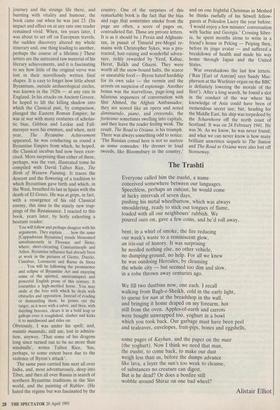The Trashti
Everyone called him the trashti, a name conceived somewhere between our languages. Speechless, perhaps an outcast, he would come at lucky intervals of seven days, pushing his metal wheelbarrow, which was always smouldering, ready to stick out tongues of flame, loaded with all our neighbours' rubbish. We poured ours on, gave a few coins, and he'd roll away, bent, in a whirl of smoke, the fire reducing our week's waste to a reminiscent glow, an iris-out of history. It was surprising he needed nothing else, no other vehicle, no dumping-ground, no help. For all we knew he was outdoing Hercules, by cleansing the whole city — but seemed too dim and slow, in a robe thrown away centuries ago.
We fill two dustbins now, one each. I recall walking from Bagh-e-Sheikh, cold in the early light, to queue for nan at the breadshop in the wall, and bringing it home draped on my forearm, hot still from the oven. Apples-of-earth and carrots were bought unwrapped too, yoghurt in a bowl which you took back. Our garbage must have been peel and tealeaves, envelopes, fruit-pips, bones and eggshells, some pages of Kayhan, and the paper on the mast (the yoghurt). Now I think we need that man, the trashti, to cpme back, to make our dust weigh less than us, before the dumps advance like lava, a layer the sun's too weak to cleanse, of substances no creature can digest.
But is he dead? Or does a bonfire still wobble around Shiraz on one bad wheel?
Alistair Elliot


























































 Previous page
Previous page